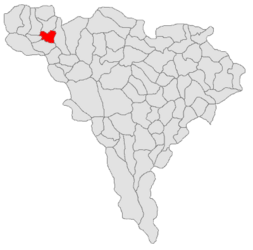Vadu Moților (German: Goldenau; Hungarian: Aranyosvágás) is a commune located in Alba County, Transylvania, Romania. It is composed of twelve villages: Bodești, Burzești, Dealu Frumos, Lăzești, Necșești, Poduri-Bricești, Popeștii de Jos, Popeștii de Sus, Tomuțești, Toțești, Vadu Moților, and Vâltori. Until January 1, 1965, both the commune and the village of Vadu Moților were named Secătura.
Vadu Moților | |
|---|---|
 Vadu Moților village | |
 Location in Alba County | |
| Coordinates: 46°24′N 22°58′E / 46.400°N 22.967°E | |
| Country | Romania |
| County | Alba |
| Government | |
| • Mayor (2020–2024) | Nicolae Lazea (PNL) |
Area | 32.14 km2 (12.41 sq mi) |
| Elevation | 731 m (2,398 ft) |
| Highest elevation | 1,400 m (4,600 ft) |
| Population (2021-12-01)[1] | 1,187 |
| • Density | 37/km2 (96/sq mi) |
| Time zone | EET/EEST (UTC+2/+3) |
| Postal code | 517795 |
| Area code | (+40) 0258 |
| Vehicle reg. | AB |
| Website | vadumotilor |
The commune belongs to the Țara Moților ethnogeographical region. It is nestled within the Apuseni Mountains, between the Bihor Mountains to the west and Muntele Mare to the east.
Vadu Moților lies on the banks of the river Arieșul Mare, at the confluence with its tributary, the river Neagra. It is located in the northwestern corner of Alba County, at a distance of 12 km (7.5 mi) from the town of Câmpeni and 92 km (57 mi) from the county seat, Alba Iulia.
At the 2021 census, the commune had a population of 1,187; of those, 97.05% were Romanians.[2]
References
edit-
Greek Catholic church in Vadu Moților village, built in 1893
-
Wooden church in Lăzești
